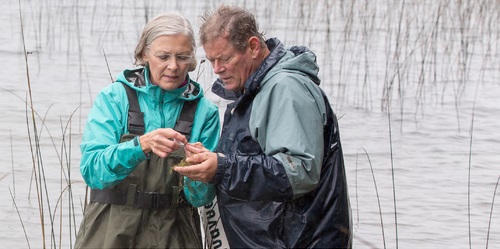Extension staff with a focus on Fish, Wildlife, and Conservation Education programs are located in statewide offices and University of Minnesota campuses. They deliver programs that educate and engage citizens and professionals in a rich community of stewardship and teaching about Minnesota wildlife, fish, and critical habitat. Many of our research programs have public outreach/engagement, such as those led by the Bell Museum curators.
Aquatic Invasive Species
FWCB partners with the Minnesota Aquatic Invasive Species Research Center to provide Extension and public outreach in response to AIS threats. The AIS Detectors program trains citizens to identify and report potential aquatic invasive species as part of an organized statewide citizen-science-based surveillance program.
The AIS Trackers program trains citizen scientists and professionals to monitor changes in populations of AIS over time in specific locations (i.e., a lake or river reach) and to generate data useful for management.
Minnesota Master Naturalist
The mission of the Minnesota Master Naturalist program is to promote awareness, understanding, and stewardship of Minnesota's natural environment by developing a corps of well-informed citizens dedicated to conservation education and service within their communities. Students participate in 40 hours of classroom instruction covering the basics of ecology for one of Minnesota's biomes, then complete a capstone project. Upon graduation, Master Naturalist volunteers conduct 40 hours of volunteer service each year to remain active in the program. Over 900 citizens from 80 Minnesota counties are part of this volunteer network!
Driven to Discover: Enabling authentic inquiry through citizen science
Driven to Discover: Enabling authentic inquiry through citizen science is a program that trains teachers and youth group leaders to plan and carry out citizen science-based research with youth. This program provides educators with the background knowledge, methods, tools, and resources needed to assist their students in participating in citizen science projects and research as well as developing their own ecology-based research project. Learn more at U of M Extension: Enabling authentic inquiry through citizen science.
Current projects and partnerships include:
Outdoor Investigations in the STEM Classroom (OISC) (2020-2022): This program provides teacher training and support to integrate a STEM-based curriculum, Raptor Lab, which includes Extension's Driven to Discover Outdoor Investigator, into their classrooms. The two-year project will reach 35 teachers and 4,000 students with a focus on school districts serving populations underrepresented in STEM fields.
*In partnership with The Raptor Center with support from the Cargill Foundation
Migratory and Urban Bird Institute (2019-2025): The Migratory & Urban Bird Institute (MUBI) is an interactive 3-day workshop led by university scientists and expert educators with an inquiry-based approach to science. PreK-12 teachers and informal educators from Minnesota and several additional states come together to study urban and migratory birds and build collaborative relationships with peers. Sessions include field work, lectures, and experiential activities. Participants gain hands-on experience in birding and work together to translate their knowledge of birds into activities and projects for their students or community members. Learn more at https://z.umn.edu/MUBI.
*In partnership with and support from the U.S. Forest Service International Programs
Pollinator Education in the Science Classroom (2022-2025): Pollinator Education in the Science Classroom will provide professional development for 60 science teachers to use pollinator education curriculum and outreach materials, ultimately reaching more than 8,000 students annually. Classroom teachers attend workshops led by bee and butterfly pollinator experts who provide additional background and context for the curriculum as well as fellow teachers familiar with the curriculum who help with effective classroom implementation. Pollinator Education Toolkits are provided to equip classrooms with materials to emphasize not only awareness of pollinator conservation but also pollinator conservation actions. Learn more at https://beelab.umn.edu/.
*In partnership with the UMN Bee Lab with support from the Environment and Natural Resources Trust Fund
Ecological Restoration Training Cooperative
The Ecological Restoration certificate is a 150-hour program of five required courses, offered twice per year. The program provides early-career professionals with the practical skills and knowledge necessary to undertake the most common kinds of Midwestern restorations including revegetation of prairies, wetlands, lakeshores, forests and savannas.
These courses were developed in partnership with staff from several Minnesota state agencies who identified a critical need to train more restoration professionals to meet the growing demand for these skills.

